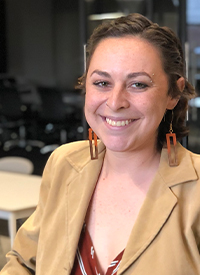by Gabrielle Sanchez-Steenberger
-Digital Communications Coordinator

Gabrielle Sanchez-Steenberger
I was a feminist before the word existed in my vocabulary. I was a strong-willed child, and a tomboy, insistent that I was just as strong and capable as the boys in my neighborhood. My family moved every few years from one midwestern town to another. I was an outgoing child, if a bit awkward, and never had trouble making friends. It never occurred to me that my mother was the only brown woman in the homogeny of white suburbia. While the other children brought peanut butter and jelly sandwiches for lunch, my purple lunchbox contained arroz y frijoles (rice and beans).
We visited Chicago twice a year for Thanksgiving and Christmas. As a child I anticipated these visits, soaking up the smell of tortillas and my tia’s (aunt’s) perfume, the cacophony of overlapping voices speaking in rapid Spanish.
There are rules for little Mexican girls, unspoken and deeply rooted in tradition and religion.
While still an infant, I had my ears pierced. As a young child, my hair was never cut but pleated into long dark braids down my back. I can recall my grandmother explaining the two options for my life; marriage or dedication to the church. This taught me that my existence held value in relation to a man. In retrospect, I can dissect gender roles and expectations through my lens of feminism and higher education, but at the time simply rejected the notion that I was must be a “young lady” and all that it entailed.
I knew when it came time for the Lord’s Prayer I would get to hold her hand. She always squeezed my hand twice.
As I grew older, my tomboy tendencies were reprimanded, and I was reminded to sit with my knees together and not speak so loudly. My education consisted of nuns measuring the length of my uniform skirt and Catholic mass twice a week. When filing into the pews with my classmates each Friday, I shuffled to position myself to sit next to the girl with the nut-brown hair; she had a laugh that sounded like bells and was kind to me. I knew when it came time for the Lord’s Prayer I would get to hold her hand. She always squeezed my hand twice.
Adolescence proved a maze of self-expression, intensified by off-the-cuff comments from the women in my family: “Boys won’t like your hairy legs” and “Donde esta su novio?” (Where is your boyfriend?). As I entered my twenties, the questions about marriage and children were ever-present. When I arrived at Christmas with an eyebrow ring and a boyish haircut, the gasps were audible.
I’ve always been aware of my queerness, but in my childhood innocence, I never gave it much thought. I was simply a tomboy, and never equated my gender expression with my sexuality. Even upon my romantic interactions with girls, I assumed, like all the women in my family, that I would grow up to marry a man and give my parents grandchildren who would be baptized by the same priest who had baptized generations of Sanchez children.
The environment of college provided me—like so many others—a chance to create an identity for myself. I realized that no one cared what I did or who I was interested in. And it was liberating. I met other young Latinos, and other queer women of color. It was as if I was visiting a different world, one where a new generation rejected the expectations of their families, and I found camaraderie.
I have reflected extensively on why Mexican gender roles and expectations are so prominent, especially for women. I have reflected on why my “masculine” personality traits were discouraged, and why my queerness would not be accepted as valid. I have, my entire life, rejected these expectations and resented the policing of my body and my behavior. I have never come out to my extended family because I never thought much good could come of it. At best, I would be met with confusion and misunderstanding. At worse, rejection and homophobia. If wearing pants to Easter mass was unacceptable, surely my queerness would be unfathomable. My self-expression has caused more than one Thanksgiving dinner argument.
I am both Mexican and American. I am both Mexican and a feminist. I am both Mexican and queer.
As I age, I have learned the grace in understanding a culture that I was previously quick to describe as oppressive. I have outgrown my resentments through the process of connecting with the women who have come before me. My abuelita (grandmother) immigrated to the United States with my papi (grandfather) when they were remarkably young, with no money or prospects. Their partnership was one of both necessity and love. They raised three children with the values of Catholicism, and it kept them out of trouble. Unfortunately, in my experience, the Catholic religion perpetuates sexist and homophobic practices. While the values of faith, compassion and honesty were passed down through generations, so was the intolerance. While as a millennial raised in the comfort of the middle-class, I can easily condemn some of their beliefs as ignorant, simultaneously I cannot ignore the sacrifice my grandparents made to allow me access to education and prosperity. Their dedication to their culture, and subsequently the values of their religion, led them to the United States, allowing me to be a free-thinker, the opportunity to pursue my own identity. Culture changes, and my generation offers a space in which identity can be complex: I am both Mexican and American. I am both Mexican and a feminist. I am both Mexican and queer.
My body has been a canvas for my culture, my identity pre-determined. I have, through pure conviction and sense of self, broken through, and find that I am still loved. People are capable of loving what they do not understand, if they only try.
A few years ago, on a snowy Christmas Eve in Chicago, my twelve-year-old prima (cousin) pulled her rainbow winter hat from her head, revealing a shaved head. She grinned at me as her father shook his head in disapproval, and her act of rebellion felt like solidarity.






Gabrielle, thank you for sharing your story. i loved it.